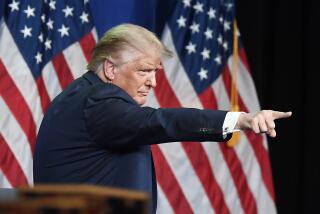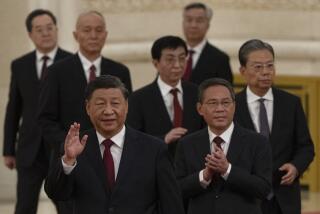China Gives New Priority to Economy : Development ‘Key Link’ in Members’ Work, Party Says
- Share via
PEKING — In a major new ideological statement, China’s ruling Communist Party on Sunday pledged to combat “the ugly and decadent aspects of capitalism” while pressing forward with its efforts to reform the nation’s economic system.
The party’s 210-member Central Committee, in its first meeting in a year, adopted a resolution nearly 10,000 words long that urges party members to take economic development as the “key link” in their work. Under the late Chairman Mao Tse-tung, Communist cadres had been told that the “key link” was to continue carrying out the class struggle.
The new resolution also declared that the effort to open China to the outside world is “a basic, unalterable state policy,” noting that “closing one’s country to external contact results only in stagnation and backwardness.”
No Sweeping Liberalization
But the resolution made it clear that China’s Marxist leadership does not intend to permit any sweeping political liberalization to accompany its drive towards modernization.
“In essence, bourgeois democracy serves to protect the capitalist system,” the party said. “ . . . Bourgeois liberalization, which means negating the socialist system in favor of capitalism, is in total contradiction to the people’s interests and to the historical trend, and it is therefore firmly opposed by the masses.”
The new document represents the most concerted attempt yet by the regime headed by Deng Xiaoping to confront directly the ideological problems it has faced in justifying its unorthodox, market-oriented economic reforms to the party rank and file. The Chinese Communist Party, which now has 44 million members, is the largest Communist Party in the world.
Three Separate Drafts
Sources have said that during the last several months, the resolution adopted Sunday went through three separate drafts. Each time the language has been watered down a bit to placate more orthodox Marxists within the party.
The document was approved in a session attended by 199 Central Committee members in a meeting at the Great Hall of the People in downtown Peking. A television report showed the party leaders sitting beneath an array of red banners and the traditional gold symbol of a hammer and sickle.
A year ago, in a special party conference, Deng and his allies succeeded in getting 64 new members elected to the Central Committee, thus effectively solidifying their political control over the party’s leading organ. The document approved Sunday attempted to placate older traditionalists while setting out the rationale for economic change.
“It is wrong to regard Marxism as a rigid dogma,” the new resolution said. “It is also wrong to negate its basic tenets, view it as an outmoded theory and blindly worship bourgeois philosophies and social doctrines.”
Over the last few years, the Chinese regime has embraced material incentives, an abolition of lifetime job security, a scaling back in the role of central state planning, a tolerance of some private enterprise and even capital markets and stock exchanges in an attempt to invigorate the nation’s economy.
Conservatives within the party--led by Politburo theoretician Hu Qiaomu and former Propaganda Minister Deng Liqun--have complained that these reforms have had negative effects on Chinese society.
In particular, they have claimed that too many Chinese are obsessed with money, the acquisition of consumer goods and the blind imitation of Western music, art, fashion and culture.
‘Spiritual Pollution’
Ideological attacks against foreign and Western influences in China reached a crescendo in the fall of 1983, when conservative ideologues mounted a campaign against what they called “spiritual pollution.”
That campaign was apparently launched with Deng’s approval, but it soon ran out of control. At the local level, party officials began attacking Western dress and hair styles. Ordinary Chinese voiced fears that the nation might be headed towards a new Cultural Revolution, and foreign businesses worried about the long-range stability of their investments.
The campaign against “spiritual pollution” was brought to a halt by early 1984. But last year, Deng and his allies found themselves on the defensive once again as party conservatives mounted an attack on “unhealthy tendencies” accompanying the reform program.
The ideological statement that won approval Sunday reaffirms the party’s commitment to Marxism, to its own role as the vanguard of “the people’s democratic dictatorship” and to the ultimate objective of achieving communism.
‘Initial Stage of Socialism’
Nevertheless, the party stressed that China is still in what was called “the initial stage of socialism.” The resolution said the party does not expect to eliminate private enterprise or differences in income in China for many years.
“For a long time to come, we shall develop varied sectors of the economy, always ensuring the dominant position of the public sector, and we shall encourage some of the people to become prosperous first, before the objective of common prosperity is reached,” the resolution said.
The new Communist Party resolution blamed China’s low level of economic development not merely on outside forces, such as Western imperialism, but also on what was called China’s own “decadent feudal system.” And the party said that these feudal influences can still be seen in China today.
“The concept of patriarchal clannishness, autocratic ways, the tendency to seek privileges and to form factions for selfish purposes, the view that men are superior to women--all these things that die hard in our social relations today are in essence manifestations of the evil influence of feudalism.”
Language Very Blunt
Employing extraordinarily blunt language, the resolution also called upon Communist Party officials to improve their public image.
“Now that the party is in power, the question of paramount importance is whether its members will wholeheartedly serve the people or behave like bureaucrats and overlords, riding roughshod over the people and abusing power for personal gain,” the party said.
Long sections of the resolution encouraged Communist Party cadres to foster “socialist morality” and “socialist humanism”--which were described in language that would have sounded familiar to Confucius.
“In our society, everyone serves and is served,” the party said. “A good attitude on the part of those who serve and the good service they offer are an expression of society’s concern for its members, and they add to social tranquility and harmonious interpersonal relations.”
Television footage of the Central Committee’s plenary session showed that all five members of the Politburo’s standing committee attended. They include Deng, party General Secretary Hu Yaobang, Premier Zhao Ziyang, President Li Xiannian and veteran economist Chen Yun.
Li and Chen are widely believed to be among those who have supported or encouraged the ideological attacks on the reform program.
During its meeting Sunday, the Central Committee also announced that there will be a national congress of nearly 2,000 delegates of the Chinese party in October, 1987. The last party congress was held in 1982.
More to Read
Sign up for Essential California
The most important California stories and recommendations in your inbox every morning.
You may occasionally receive promotional content from the Los Angeles Times.









